True History of the Kelly Gang

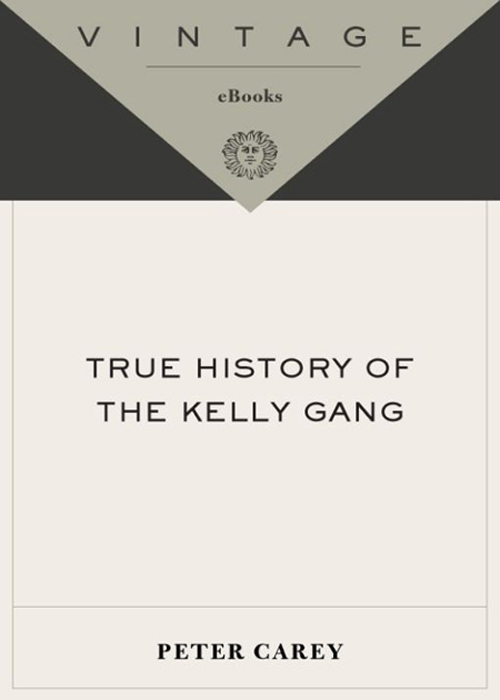
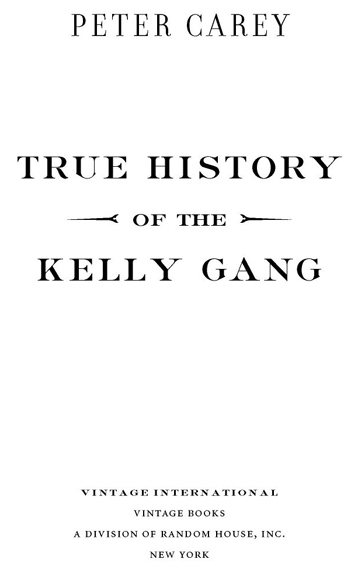
Table of Contents
PARCEL ONE - His Life until the Age of 12
PARCEL TWO - His Life Ages 12–15
PARCEL THREE - His Life at 15 Years of Age
PARCEL FOUR - His Life at 16 Years of Age
PARCEL FIVE - His Early Contact with Senior Policemen
PARCEL SIX - Events Precipitated by the Arrest of Harry Power
PARCEL SEVEN - His Life Following His Later Release from Pentridge Gaol
PARCEL NINE - The Murders at Stringybark Creek
PARCEL TEN - The History Is Commenced
PARCEL ELEVEN - His Life at 25 Years of Age
PARCEL TWELVE - Conception and Construction of Armour
for Alison
Summers
The past is not dead. It is not even past.
WILLIAM FAULKNER
ACCLAIM FOR PETER CAREY’S
TRUE HISTORY
OF THE KELLY GANG
A TIME MAGAZINE BEST BOOK OF THE YEAR
AN ECONOMIST BEST BOOK OF THE YEAR
“Lean, pared down for speed, and wholly convincing not only as an outback adventure but also as a psychological and historical drama. . . . A spectacular feat of imagination.”
—
The Boston Globe
“Carey succeeds in creating an account that not only feels authentic but also passes as a serious novel and solid, old-fashioned ‘entertainment.’ ”
—
San Francisco Chronicle
“A remarkable achievement.”
—
The Wall Street Journal
“In this bracing narrative, Carey has given Kelly back his tongue with a style that rips like a falling tree. . . . Carey is a man who isn’t afraid to stand in water during lightning and tell us what it’s like.”
—
The Christian Science Monitor
“So adroit that you never doubt it’s Kelly’s own words you’re reading in the headlong, action-packed story.”
—
Newsweek
“Peter Carey’s Ned Kelly is somebody worth knowing and remembering, and his novel is also worth our best attention.”
—
The Washington Post Book World
“Brilliantly executed. . . . Carey’s Kelly is filled out in Browningesque depth.”
—
The Times Literary Supplement
“Hypnotic. . . . Prose shot through with poetry and run together in an altogether brilliant way. . . . A roaring challenge of a book that takes readers on a wild, unforgettable ride.”
—
The Oregonian
“Epic storytelling, outsized in its sensibilities and as often laugh out-loud funny as it is fraught with tragedy.”
—
The Miami Herald
“An entrancing chronicle of a larger-than-life folk hero.”
—
The Denver Post
“Close to letter-perfect.”
—The San Diego Union-Tribune
“Carey is a skilled and cunning writer. . . . The tale is packed with action and incident, and has all the garish colors of the outback itself.”
—
The New York Review of Books
“A marvelous accomplishment, certainly as engrossing as anything Carey has written. . . . He’s created in Kelly an endlessly fascinating character.”
—
New York Post
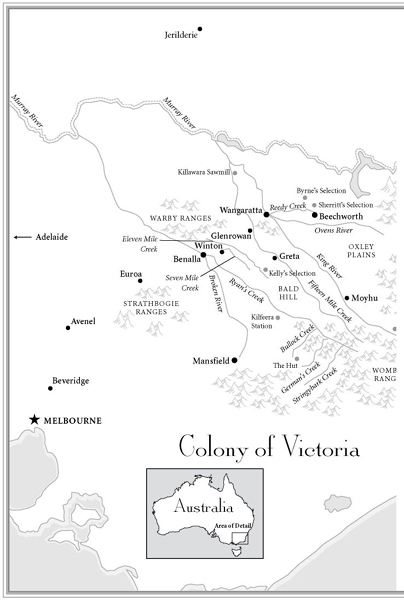
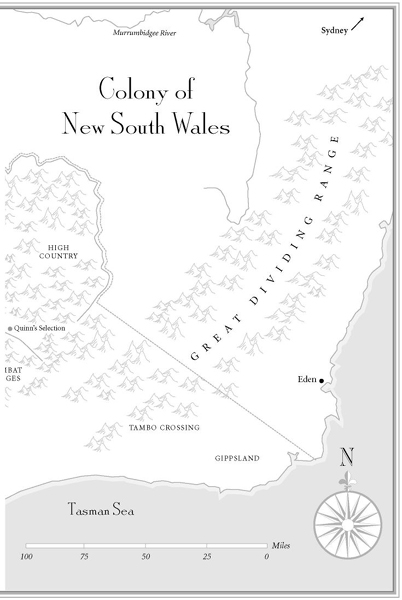
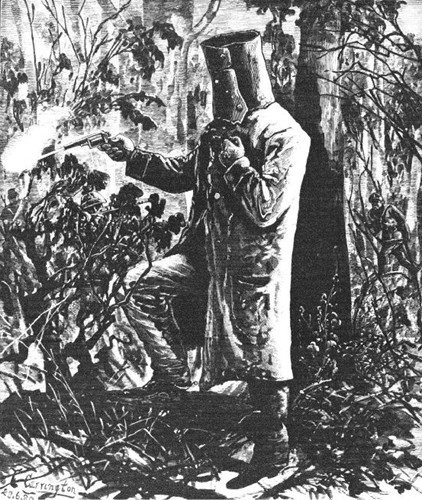
By dawn at least half the members of the Kelly gang were badly wounded
and it was then the creature appeared from behind police lines. It was nothinghuman, that much was evident. It had no head but a very long thick
neck and an immense chest and it walked with a slow ungainly gait directly
into a hail of bullets. Shot after shot was fired without effect and the figure
continued to advance on the police, stopping every now and then to move its
headless neck slowly and mechanically around.
I am the b––––y Monitor, my boys.
The police had modern Martini-Henry rifles yet the bullets bounced off
the creature’s skin. It responded to this attack, sometimes with a pistol shot,
but more often by hammering the butt of its revolver against its neck, the
blows ringing with the clearness and distinctiveness of a blacksmith’s hammerin the morning air.
You shoot children, you f–––––g dogs. You can’t shoot me.
As the figure moved towards a dip in the ground near to some white
dead timber, the police intensified their attack. Still the figure remained
erect, continuing the queer hammering on its neck. Now it paused and as its
mechanical turret rotated to the left the creature’s attention was taken by a
small round figure in a tweed hat standing quietly beside a tree. The creature
raised its pistol and shot, and the man in the tweed hat coolly kneeled before
it. He then raised his shotgun and fired two shots in quick succession.
My legs, you mongrel.
The figure reeled and staggered like a drunken man and in a few
moments fell near the dead timber. Moments later a crude steel helmet like
a bucket was ripped from the shoulders of a fallen man. It was Ned Kelly, a
wild beast brought to bay. He was shivering and ghastly white, his face and
hands were smeared with blood, his chest and loins were clad in solid steel-platearmour one quarter of an inch thick.
Meanwhile the man responsible for this event had drawn his curtains
and was affecting to have no interest in either the gunshots or the cries of the
wounded.
At dark a party of police escorted him and his wife directly from his
cottage to the Special Train and so he neither witnessed nor took part in
the wholesale souveniring of armour and guns and hair and cartridges that
occurred at Glenrowan on June 28th 1880. And yet this man also had a keep-sakeof the Kelly Outrage, and on the evening of the 28th, thirteen parcels of
stained and dog-eared papers, every one of them in Ned Kelly’s distinctive
hand, were transported to Melbourne inside a metal trunk.
Undated, unsigned, handwritten account in the collection of
the Melbourne Public Library. (V.L. 10453)
PARCEL ONE

His Life until the Age of 12
National Bank letterhead. Almost certainly taken from the Euroa Branch of the National Bank in December 1878. There are 45 sheets of medium stock (8‘ × 10‘ approx.) with stabholes near the top where at one time they were crudely bound. Heavily soiled.
Contains accounts of his early relations with police
including an accusation of transvestism. Some recollections
of the Quinn family and the move to the township of Avenel.
A claim that his father was wrongly arrested for the theft of
Murray’s heifer. A story explaining the origins of the sash
presently held by the Benalla Historical Society. Death of
John Kelly.
I LOST MY OWN FATHER AT
12 yr. of age and know what it is to be raised on lies and silences my dear daughter you are presently too young to understand a word I write but this history is for you and will contain no single lie may I burn in Hell if I speak false.
God willing I shall live to see you read these words to witness your astonishment and see your dark eyes widen and your jaw drop when you finally comprehend the injustice we poor Irish suffered in this present age. How queer and foreign it must seem to you and all the coarse words and cruelty which I now relate are far away in ancient time.
Your grandfather were a quiet and secret man he had been ripped from his home in Tipperary and transported to the prisons of Van Diemen’s Land I do not know what was done to him he never spoke of it. When they had finished with their tortures they set him free and he crossed the sea to the colony of Victoria. He were by this time 30 yr. of age red headed and freckled with his eyes always slitted against the sun. My da had sworn an oath to evermore avoid the attentions of the law so when he saw the streets of Melbourne was crawling with policemen worse than flies he walked 28 mi. to the township of Donnybrook and then or soon thereafter he seen my mother. Ellen Quinn were 18 yr. old she were dark haired and slender the prettiest figure on a horse he ever saw but your grandma was like a snare laid out by God for Red Kelly. She were a Quinn and the police would never leave the Quinns alone.
My 1st memory is of Mother breaking eggs into a bowl and crying that Jimmy Quinn my 15 yr. old uncle were arrested by the traps. I don’t know where my daddy were that day nor my older sister Annie. I were 3 yr. old. While my mother cried I scraped the sweet yellow batter onto a spoon and ate it the roof were leaking above the camp oven each drop hissing as it hit.
My mother tipped the cake onto the muslin cloth and knotted it. Your Aunt Maggie were a baby so my mother wrapped her also then she carried both cake and baby out into the rain. I had no choice but follow up the hill how could I forget them puddles the colour of mustard the rain like needles in my eyes.
We arrived at the Beveridge Police Camp drenched to the bone and doubtless stank of poverty a strong odour about us like wet dogs and for this or other reasons we was excluded from the Sergeant’s room. I remember sitting with my chilblained hands wedged beneath the door I could feel the lovely warmth of the fire on my fingertips. Yet when we was finally permitted entry all my attention were taken not by the blazing fire but by a huge red jowled creature the Englishman who sat behind the desk. I knew not his name only that he were the most powerful man I ever saw and he might destroy my mother if he so desired.
Approach says he as if he was an altar.
My mother approached and I hurried beside her. She told the Englishman she had baked a cake for his prisoner Quinn and would be most obliged to deliver it because her husband were absent and she had butter to churn and pigs to feed.
No cake shall go to the prisoner said the trap I could smell his foreign spicy smell he had a handlebar moustache and his scalp were shining through his hair.
Said he No cake shall go to the prisoner without me inspecting it 1st and he waved his big soft white hand thus indicating my mother should place her basket on his desk. He untied the muslin his fingernails so clean they looked like they was washed in lye and to this day I can see them livid instruments as they broke my mother’s cake apart.
Tis not poverty I hate the most
nor the eternal grovelling
but the insults which grow on it
which not even leeches can cure
I will lay a quid that you have already been told the story of how your grandma won her case in court against Bill Frost and then led wild gallops up and down the main street of Benalla. You will know she were never a coward but on this occasion she understood she must hold her tongue and so she wrapped the warm crumbs in the cloth and walked out into the rain. I cried out to her but she did not hear so I followed her skirts across the muddy yard. At 1st I thought it an outhouse on whose door I found her hammering it come as a shock to realise my young uncle were locked inside. For the great offence of duffing a bullock with cancer of the eye he were interred in this earth floored slab hut which could not have measured more than 6 ft. × 6 ft. and here my mother were forced to kneel in the mud and push the broken cake under the door the gap v. narrow perhaps 2 in. not sufficient for the purpose.
She cried God help us Jimmy what did we ever do to them that they should torture us like this?
My mother never wept but weep she did and I rushed and clung to her and kissed her but still she could not feel that I were there. Tears poured down her handsome face as she forced the muddy mess of cake and muslin underneath the door.
She cried I would kill the b–––––ds if I were a man God help me. She used many rough expressions I will not write them here. It were eff this and ess that and she would blow their adjectival brains out.
These was frightening sentiments for a boy to hear his mamma speak but I did not know how set she were until 2 nights later when my father returned home and she said the exact same things again to him.
You don’t know what you’re talking about said he.
You are a coward she cried. I blocked my ears and buried my face into my floursack pillow but she would not give up and neither would my father turn against the law. I wish I had known my parents when they truly loved each other.
You will see in time your grandfather were a man of secrets and what he said and done was different things though for now it is enough to know my mother had one idea about my father and the police the opposite. She thought him Michael Meek. They knew him as a graduate of Van Diemen’s Land and a criminal by birth and trade and marriage they was constantly examining the brands on our stock or sifting through our flour for signs of larceny but they never found nothing except mouse manure they must have had a mighty craving for the taste.
Nor was your grandmother as unfriendly towards the police as you would expect if solely instructed by her testimony she might of wished to murder them but would not mind a little drink and joke before she done the deed. There was one Sergeant his name O’Neil my mother seemed to like him better than the rest. I am talking now of a later time I must have been 9 yr. of age for our sister Kate had just been born. Our father were away contracting and our small hut were more crowded than ever now there was 6 children all sleeping between the maze of patchwork curtains Mother hung to make up for the lack of walls. It were like living in a cupboard full of dresses.
Into this shadowy world Sgt O’Neil did come with queer white hair which he were always combing like a girl before a dance he were v. friendly to us children and on the night in question he brung me the gift of a pencil. At school we used the slates but I never touched a pencil and was most excited to smell the sweet pine and graphite as the Sergeant sharpened his gift he were very fatherly towards me and set me at one end of the table with a sheet of paper. My sister Annie were 1 yr. older she got nothing from O’Neil but thats another story.
I set to work to cover my paper with the letters of the alphabet. My mother sat at the other end of the table with the Sgt and when he produced his silver flask I paid no more attention than I did to Annie & Jem & Maggie & Dan. After I made each letter as a capital I set to do the smaller ones such were my concentration that when my mother spoke her voice seemed very far away.
Get out of my house.
I looked up to discover Sergeant O’Neil with his hand to his cheek I suppose she must of slapped him for his countenance were turned v. red.
Get out my mother shrieked she had the Irish temper we was accustomed to it.
Ellen you calm yourself you know I never meant nothing in the least improper.
Eff off my mother cried.
The policeman’s voice took a sterner character. Ellen said he you must not use such language to a police officer.
That were a red rag to my mother she uncoiled herself from her seat. You effing mongrel she cried her voice louder again. You wouldnt say that if my husband were not gone contracting.
I will issue one more warning Mrs Kelly.
At this my mother snatched up the Sergeant’s teacup and threw the contents onto the earthen floor. Arrest me she cried arrest me you coward.
Baby Kate woke crying then. Jem were 4 yr. old sitting on the floor playing knuckles but when the brandy splashed beside him he let the bones lie quiet. Of a different disposition I begun to move towards my mother.
Did you hear your mother call me a coward old chap?
I would not betray her I walked round the table and stood next to her. Said he You was busy writing Ned?
I took my mother’s hand and she put her arm around my shoulder.
You are a scholar aint it he asked me.
I said I were.
Then you must know about the history of cowards. I were confused I shook my head.
Next O’Neil was bouncing to his feet and showing the full hard stretch of his policeman’s boots said he Let me educate you young man. No said my mother her manner now completely changed. Please no.
A moment earlier O’Neil had a stiff and worried air but now there was a dainty sort of prance about him. O yes said he all children should know their history indeed it is quite essential.
My mother wrenched her hand from mine and reached out but the Ulsterman ducked behind the 1st set of curtains and emerged to prowl in and out and around our family he even patted little Dan upon his silky head. My mother were afraid her face was pale and frozen. Please Kevin.
But O’Neil was telling us his story we had to quiet to listen to him he had the gift. It were a story of a man from Tipperary named only A Certain Man or This Person Who I Will Not Name. He said A Certain Man had a grudge against a farmer for lawfully evicting his tenant and This Person etc. conspired with his mates to kill the farmer.
I’m sorry said my mother I already apologised.
Sgt O’Neil made a mocking bow continuing his story without relent telling how This Certain Man did 1st write a threatening letter to the landlord. When the landlord ignored the letter and evicted the tenant This Certain Man called a SELECT MEETING of his allies to a chapel in the dead of night where they drank whisky from the Holy Goblet and swore upon the Holy Book then he said to them Brothers for we are all brothers sworn upon all thats blessed and Holy. Brothers are you ready in the name of God to fulfil your oaths? They said they was they swore it and when they done their blasphemy they descended upon the farmer’s house with pikes and faggots burning.
Sergeant O’Neil seemed much affected by his own story his voice grew loud he said the farmer’s children screamed for mercy at the windows but the men set their home alight and those who escaped they piked to death there was mothers and babes in arms the Sgt would not spare us either he painted the outrage in every detail we children were all silent open mouthed not only at the horror of the crime but also the arrest of the Guilty Parties and the treachery of This Certain Man who betrayed all he had drawn into his conspiracy. The accomplices was hanged by the neck until dead and the Ulsterman let us imagine how this might be he did not conceal the particulars.
What happened then he asked we could not answer nor speak nor did we wish to hear.
This Certain Man kept his life he were transported to Van Diemen’s Land. And with that Sergeant O’Neil strode out our door into the night.
Mother said nothing further she did not move not even when we heard the policeman’s mare cantering along the dark road up the hill to Beveridge I asked her what was meant by This Certain Man and she give me such a clip across the ears I never asked again. In time I understood it were my own father that was referred to.
The memory of the policeman’s words lay inside me like the egg of a liver fluke and while I went about my growing up this slander wormed deeper and deeper into my heart and there grew fat.
Sergeant O’Neil had filled my boy’s imagination with thoughts that would breed like maggots on a summer day you would think his victory complete but he begun to increase his harassment of my father rousing him from bed when he were drunk or fast asleep he also needled and teased me whenever he seen me in the street.